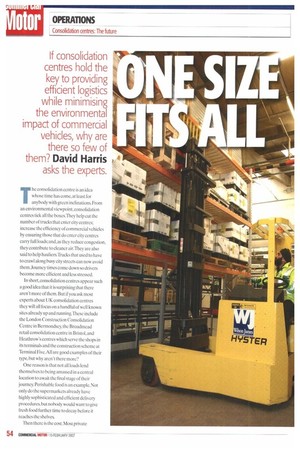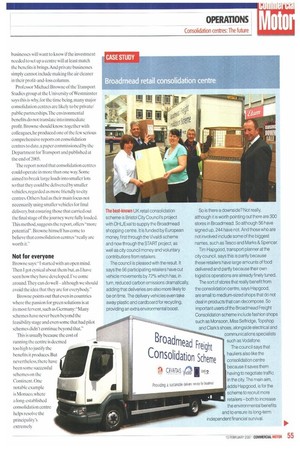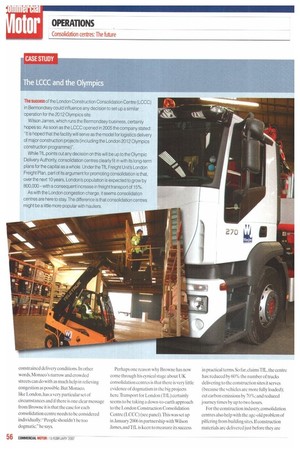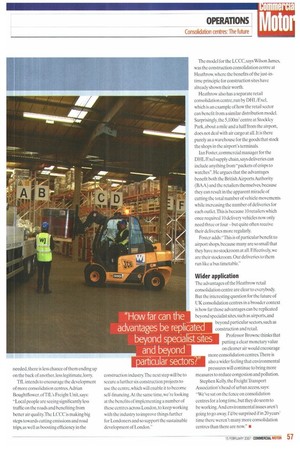If consolidation centres hold the key to providing efficient logistics
Page 54

Page 55

Page 56

Page 57

If you've noticed an error in this article please click here to report it so we can fix it.
while minimising the environmental impact of commercial vehicles, why are there so few of
them? David Harris
asks the experts.
The consolidation centre is an idea whose time has come, at least for anybody with green inclinations. From an environmental viewpoint, consolidation centres tick all the boxes.They help cut the number of trucks that enter city centres; increase the efficiency of commercial vehicles by ensuring those that do enter city centres carry full loads; and, as they reduce congestion, they contribute to cleaner air.They are also said to help hauliers, Trucks that used to have to crawl along busy city streets can now avoid them. Journey times come down so drivers become more efficient and less stressed.
In short, consolidation centres appear such a good idea that it is surprising that there aren't more of them. But if you ask most experts about UK consolidation centres they will all focus on a handful of well known sites already up and running.These include the London Construction Consolidation Centre in Bermondsey. the Broadmead retail consolidation centre in Bristol,and Heathrow's centres which serve the shops in its terminals and the construction scheme at Terminal Five.All are good examples of their type, but why aren't there more'?
One reason is that not all loads lend themselves to being amassed in a central location to await the final stage of their journey. Perishable food is an example. Not only do the supermarkets already have highly sophisticated and efficient delivery procedures. but nobody would want to give fresh food further time to decay before it reaches the shelves.
Then there is the cost. Most private businesses will want to know if the investment needed to set up a centre will at least match the benefits it brings. And private businesses simply cannot include making the air cleaner in their profit-and-loss columns.
Professor Michael Browne of the Transport Studies group at the University of West minster says this is why, for the time being, many major consolidation centres are likely to be private/ public partnerships.The environmental benefits do not translate into immediate profit. Browne should know: together with colleagues, he produced one of the few serious comprehensive reports on consolidation centres to date, a paper commissioned by the Department for Transport and published at the end of 2005.
The report noted that consolidation centres could operate in more than one way. Some aimed to break large loads into smaller lots so that they could be delivered by smaller vehicles, regarded as more friendly to city centres. Others had as their main focus not necessarily using smaller vehicles for final delivery, but ensuring those that carried out the final stage of the journey were fully loaded. This method, suggests the report, of fers "more potential". Browne himself has come to believe that consolidation centres "really are worth it."
Not for everyone
Browne says:" 1 started with an open mind. Then I got cynical about them but, as I have seen how they have developed. I've come around.They can do well although we should avoid the idea that they are for everybody."
Browne points out that even in countries where the passion for green solutions is at its most fervent, such as Germany: "Many schemes have never been beyond the feasibility stage and even some that had pilot schemes didn't continue beyond that."
This is usually because the cost of running the centre is deemed too high to justify the benefits it produces. But nevertheless, there have been some successful schemes on the Continent. One notable example is Monaco, where a long-established consolidation centre helps resolve the principality's extremely The best-known UK retail consolidation scheme is Bristol City Council's project with DHL/Exel to supply the Broadmead shopping centre. It is funded by European money, first through the Vivaldi scheme and now through the START project, as well as city council money and voluntary contributions from retailers.
The council is pleased with the result. It says the 56 participating retailers have cut vehicle movements by 72% which has, in turn, reduced carbon emissions dramatically, adding that deliveries are also more likely to be on time. The delivery vehicles even take away plastic and cardboard for recycling, providing an extra environmental boost. So is there a downside? Not really, although it is worth pointing out there are 300 stores in Broadmead. So although 56 have signed up, 244 have not. And those who are not involved include some of the biggest names, such as Tesco and Marks &Spencer.
Tim Hapgood, transport planner at the city council, says this is partly because these retailers have large amounts of food delivered and partly because their own logistics operations are already finely tuned.
The sort of stores that really benefit from the consolidation centre, says Hapgood, are small to medium-sized shops that do not deal in products that can decompose. So important users of the Broadmead Freight Consolidation scheme include fashion shops such as Monsoon, Miss Selfridge, Topshop and Clark's shoes, alongside electrical and communications specialists such as Vodafone.
The council says that hauliers also like the consolidation centre because it saves them having to negotiate traffic in the city. The main aim, adds Hapgood, is for the scheme to recruit more retailers-both to increase the environmental benefits and to ensure its long-term independent financial survival.
constrained delivery conditions. In other words,Monaco's narrow and crowded streets can do with as much help in relieving congestion as possible. But Monaco, like London, has a very particular set of circumstances and if there is one clear message from Browne it is that the case for each consolidation centre needs to be considered individually:"People shouldn't be too dogmatic,he says. Perhaps one reason why Browne has now come through his cynical stage about UK consolidation centres is that there is very little evidence of dogmatism in the big projects here.Transport for London (TfL) certainly seems to be taking a down-to-earth approach to the London Construction Consolidation Centre (LCCC) (see panel).This was set up in January 2006 in partnership with Wilson James, and TfL is keen to measure its success in practical terms. So far, cl aimsTfL. the centre has: reduced by 60% the number of trucks delivering to the construction sites it serves (because the vehicles are more fully loaded); cut carbon emissions by 70%; and reduced journey times by up to two hours.
For the construction industry, consolidation centres also help with the age-old problem of pilfering from building sites. If construction materials are delivered just before they are needed, there is less chance of them ending up on the back of another, less legitimate, lorry.
TfL intends to encourage the development of more consolidation centres.Adrian Boughtflower. of TfL's Freight Unit, says: -Local people are seeing significantly less traffic on the roads and benefiting from better air quality.The LCCC is making big steps towards cutting emissions and road trips, as well as boosting efficiency in the construction industry. The next step will be to secure a further six construction projects to use the centre, which will enable it to become self-financing. At the same time, we're looking at the benefits of implementing a number of these centres across London, to keep working with the industry to improve things further for Londoners and so support the sustainable development of London. The model for the LCCC, says Wilson James, was the construction consolidation centre at Heathrow, where the benefits of the just-intime principle for construction sites have already shown their worth.
Heathrow also has a separate retail consolidation centre, run by DHL/Exel, which is an example of how the retail sector can benefit from a similar distribution model. Surprisingly, the 5,100m2centre at Stockley Park, about a mile and a half from the airport, does not deal with air cargo at all. It is there purely as a warehouse for the goods that stock the shops in the airport's terminals.
Ian Foster, commercial manager for the DHL/Exel supply chain, says deliveries can include anything from "packets of crisps to watches". He argues that the advantages benefit both the British Airports Authority (BA A) and the retailers themselves, because they can result in the apparent miracle of cutting the total number of vehicle movements while increasing the number of deliveries for each outlet.This is because 10 retailers which once required 10 delivery vehicles now only need three or four— but quite often receive their deliveries more regularly.
Foster adds:"This is of particular benefit to airport shops, because many are so small that they have no stockroom at all. Effectively, we are their stockroom. Our deliveries to them run like a bus timetable."
Wider application
The advantages of the Heathrow retail consolidation centre are clear to everybody. But the interesting question for the future of UK consolidation centres in a broader context is how far those advantages can be replicated beyond specialist sites, such as airports, and beyond particular sectors, such as construction and retail.
Professor Browne thinks that putting a clear monetary value on cleaner air would encourage more consolidation centres.There is also a wider feeling that environmental pressures will continue to bring more measures to reduce congestion and pollution.
Stephen Kelly, the Freight Transport Association's head of urban access. says: "We've sat on the fence on consolidation centres for a longtime, but they do seem to be working.And environmental issues aren't going to go away. I'd be surprised if in 20 years' time there weren't many more consolidation centres than there are now."


























































































































































































